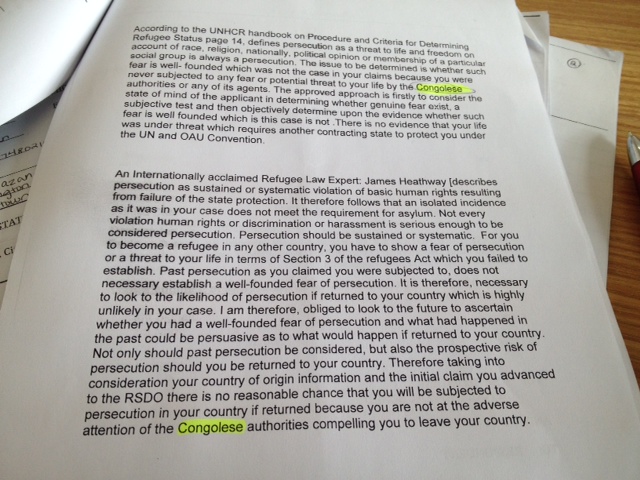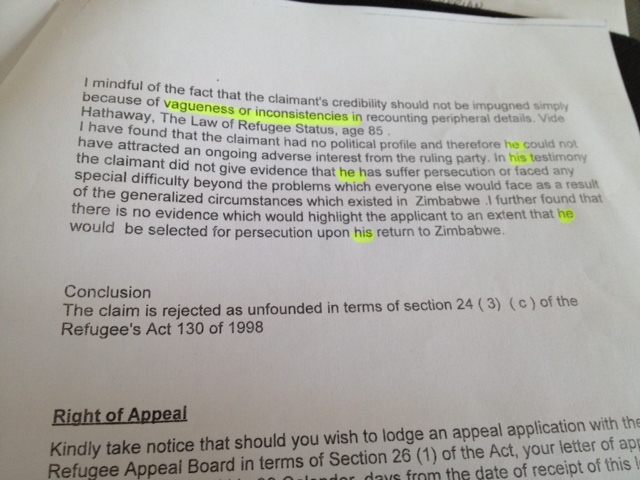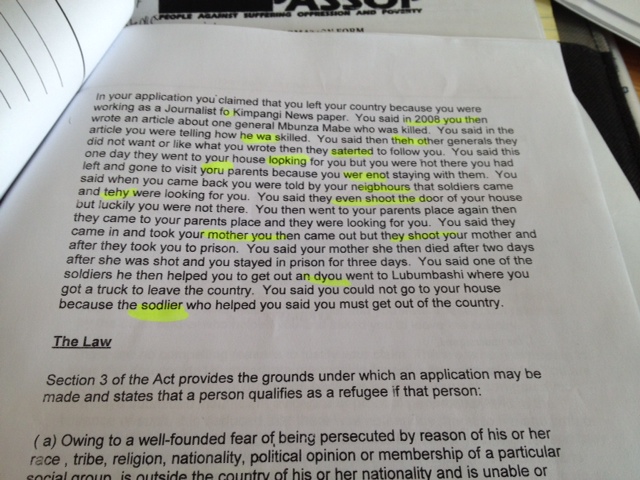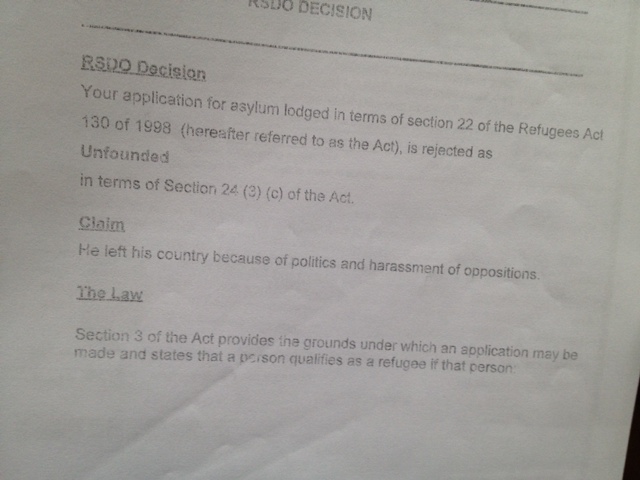Welcome Home? The Department of Home Affairs and Asylum Decision Letters
As I had mentioned in previous posts, the main focus of my work with PASSOP is writing appeal affidavits for refugee clients. Before coming to the legal team at PASSOP, the refugee has applied for asylum with the South African Department of Home Affairs. Typically, the clients I have assisted started their application at least two years ago, but many have applied as long ago as 2008. Many of these clients have also had their Section 22 temporary asylum permit renewed a few times while they are waiting for their asylum hearing interview. When they finally receive an interview, they speak with a Refugee Status Determination Officer (RSDO) to explain why they left their country of citizenship. Then, according to PASSOP’s research, about ninety-five percent of these refugees are told by the RSDO that they are denying their application. They are then given a denial letter that lists the refugee’s claim, the relevant Refugee Act statutes, the RDSO’s view of the refugee’s credibility, RSDO reason for their denial, and instructions that they must appeal the decision within thirty days of their hearing. It is at this point that the refugee comes to PASSOP for assistance with his or her appeal affidavit.
Before I interview a client, I read their denial letter to try to familiarize myself with their claim and why they were denied. I then speak with the client and ask why they left their country to verify the claim written in the decision letter. I start with very general questions such as “What country are you from?,” or “When did you come to South Africa?” Then I usually, ask, “Tell me why you left your country?” Stunningly, almost every client I have had has answered with a much more detailed claim than what is written in his or her denial letter. I have also have had several clients who had significant errors present in their decision letters. Many of my clients have said that they were confused by the RSDO’s questions due to their lack of ease with the English language, and that they just signed the decision letter without knowing exactly what it meant. Some of the most glaring examples of errors in decisions letters have included incorrect country of origin identification, incorrect gender identification, grammar, and spelling errors.
Incorrect Country of Origin: Client was from Burundi

Incorrect Gender: Client was Female

Poor Grammar and Spelling

While I am happy to help correct some of the errors in clients’ appeal affidavits, especially because I believe it makes it easier to rebut the decision of the RSDO, it is extremely discouraging to see this occur with almost each and every one of my clients. It forces them to continue to be in a liminal space, fitting in no category, with no country, and with no idea whether they will have permanent asylum for another extended period of time. It also leads me to believe that the asylum process does not reflect South Africa’s desire to grant asylum to worthy candidates, but as a system to simply manage the huge, unpopular wave of immigrants seeking the protection of South Africa’s extensive rights for refugees.
Lack of Information: client had been politically persecuted, was shot three times, and his whole family was murdered by the governement, but the claim is general, only two sentences long, and does not mention the client's experiences

Citing "Wikipedia" as an Official Source

When I arrived on my first day, I was told that PASSOP’s policy is to help every client that walks in its door seeking aid. Although this seemed like a strange policy to me at first, as not every refugee will have a good asylum claim, the more rejection letters I read, the more I understand it. Most of my clients, especially those coming from the hugely unstable Democratic Republic of the Congo, have excellent claims. But regardless of their claim, I am beginning to believe that a good many of them did not receive a fair hearing or evaluation. Therefore, I am happy to appeal these decisions and put forth the strongest claim I can make for each client. I believe every person who is seeking asylum should at least get the chance to fully be heard and that all the facts of his or her story should be known and considered before being dismissed. Sometimes offering to communicate with them in a language they are more comfortable with like French or just being patient enough to listen and to try to understand them makes all the difference.
My supervisor, Bernard, has just returned from a month long training course in Johannesburg. He has been inspired by his time away to lead our team in writing a report on the denial letters that frustrate our team each day. In preparation for this report, he has asked our team to read a report by the African Centre for Migration and Society aptly called, “All Roads Lead to Rejection: Persistent Bias and Incapacity in South African Refugee Status Determination.” Sadly the report has confirmed what I have seen in my own work, that the Department of Home Affairs, despite its name, is not a homey, or welcoming place for those seeking refuge. I am not sure what our report will lead to, but I hope that it might one day make the Department of Home Affairs take more care in its decision-making.